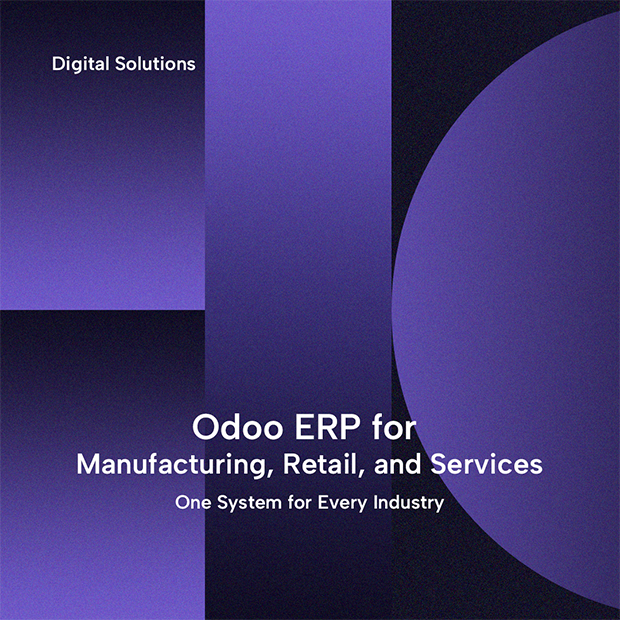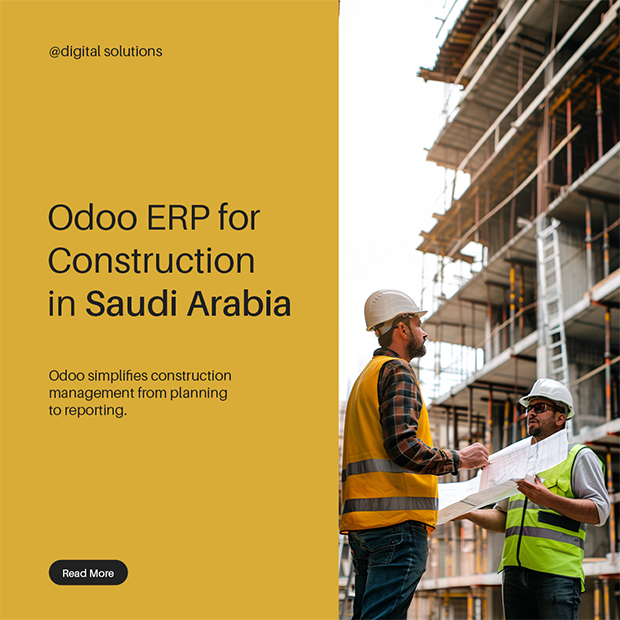Odoo ERP for Manufacturing, Retail, and Services: One System for Every Industry
Odoo has matured from an open-source ERP into a powerful, modular platform that unifies core business functions — accounting, inventory, manufacturing, sales, POS, CRM, HR and more — into one single system. In this article we explain how Odoo serves Manufacturing, Retail, and Service industries from a single platform, highlight the features and implementation approach that make it possible, and show how EUSOL (a certified Odoo partner) helps businesses implement, customize, and scale Odoo to achieve measurable results. If you want a hands-on walkthrough, get a free demo today — contact details for Pakistan, Saudi Arabia and the Maldives are at the end of this article. Odoo+1
Why Odoo is the One System for Every Industry
Odoo’s strength comes from its modular architecture: you can start with a few core apps (Sales, Invoicing, Inventory) and add modules (Manufacturing, POS, Projects, HR, Website, eCommerce, IoT) as your business grows. This eliminates data silos — the same customer record, product SKU, and invoice live across the whole system — and reduces manual reconciliation between separate tools. Odoo’s frequent releases add vertical-specific capabilities (manufacturing planning, ecommerce improvements, AI enhancements), so organizations get continuing value without rip-and-replace projects. Odoo+1
For businesses that need flexibility, Odoo offers:
Unified data model: one source of truth for customers, products, inventory and accounting.
Modular growth path: pay for what you use and expand modules as needed.
Customizability: Odoo Studio and custom modules allow functional tailoring without breaking upgrades.
Cloud and on-premise options: choose SaaS (Odoo Online / Odoo.sh) or self-hosting depending on compliance and control needs. Odoo
Below we walk through concrete ways Odoo addresses the needs of Manufacturing, Retail, and Services — and why the same platform can serve all three effectively.
Odoo for Manufacturing — control, traceability, and efficiency
Manufacturing businesses require accurate planning, traceability, and tight integration between shop-floor activities and inventory/accounting. Odoo’s Manufacturing (MRP) and Inventory modules deliver these capabilities out-of-the-box and can be extended to support industry-specific requirements.
Key manufacturing capabilities in Odoo:
Master Production Scheduling & MRP planning: handle multi-level bills of materials (BoMs), plan manufacturing runs, and respect constraints like batch sizes and lead times. This gives production managers a single view of demand vs capacity. Odoo
Batch / Lot and serial number traceability: critical for food, pharma and high-regulation industries where recall and expiry tracking are required. Odoo ties lot/serial tracking to manufacturing and sales processes so traceability is end-to-end. Odoo
Quality checks and IoT-enabled shop floor: Odoo supports quality control points (inspections at different stages) and integrates with IoT devices (scales, barcode scanners, label printers) so measurements and scans are recorded directly into the ERP. This reduces manual data capture errors and speeds up the production cycle. Odoo+1
Work orders & routing: multi-step routing, parallel operations, and resource scheduling ensure realistic shop-floor execution and capacity utilization.
Inventory synchronization: automatic stock consumption from BoMs keeps inventory and COGS consistent, streamlining accounting and reporting.
Practical benefits for manufacturers:
Reduced stockouts and fewer expedited shipments through better planning.
Lower scrap and rework due to enforced quality checks.
Faster month-end closing because inventory and cost flows are automated.
Real-time visibility into production status and order fulfillment.
EUSOL works with manufacturers to configure Odoo’s MRP workflows, map BoMs, implement lot/serial policies and connect IoT devices so production data flows directly into the ERP — reducing manual work and enabling better decisions. eusol.net
Odoo for Retail & eCommerce — omnichannel selling from one platform
Retailers face the challenge of unifying online and in-store experiences while keeping inventory accurate and payments reconciled. Odoo’s eCommerce and Point of Sale (POS) apps are built to work together, enabling omnichannel retail from one database.
Retail capabilities that matter:
Integrated POS + eCommerce: the same product catalog, pricing rules, promotions and loyalty programs can be used across physical stores and online shops, so customers get consistent experiences and inventory is synchronized.
Click & Collect, multi-warehouse visibility: customers can choose pickup locations or get live stock availability per warehouse on product pages. These flows reduce cart abandonment and improve fulfillment accuracy. Odoo
One-page checkout & SEO features: modern checkout optimizations and SEO-friendly site structures help conversion and organic search performance.
Barcode & mobile POS support: modern checkout counters, mobile selling, and rapid barcode scanning reduce queue times and improve conversion.
Promotions, bundles and subscription selling: support for seasonal promotions, dynamic pricing, and subscription models for recurring revenue.
Retailers who deploy Odoo gain:
A single inventory truth across channels (reducing overselling).
Faster cashier operations and reduced reconciliation time.
Better cross-sell / upsell opportunities by combining POS and CRM data.
EUSOL helps retail clients implement omnichannel strategies using Odoo — from catalog and pricing strategy to POS setup, online store design and logistics coordination — ensuring your retail systems behave like a single, coherent platform. See EUSOL’s retail and Saudi-market services for local compliance and localization. eusol.net+1
Odoo for Services — efficiency, scheduling and client management
Service businesses — consultancies, field services, agencies, and professional services firms — need to manage projects, schedule staff, track time, invoice accurately, and keep customer relationships healthy. Odoo packs CRM, Projects, Timesheets, Appointments, and Invoicing into one platform that removes friction from managing billable work.
Why Odoo fits services:
Integrated CRM → Project → Invoice: convert leads to projects and billable tasks without manual data transfer; time entries and expenses feed directly into invoices.
Appointment scheduling and field service: customers can book appointments online, and field teams receive dispatches and job details on mobile devices. Odoo tracks service SLAs and job completion statuses. Odoo
Resource planning & utilization dashboards: managers can balance workloads, forecast capacity, and optimize employee utilization to maximize profitability.
Subscription & recurring billing: ideal for managed services or retainer models where recurring invoices and renewal management are needed.
Service organizations using Odoo typically see:
Faster quote-to-cash cycles due to integrated workflows.
Better project margin tracking from time and expense recording.
Higher client satisfaction because information is centralized and responsive.
EUSOL configures Odoo for service operations by mapping your billing models (hourly, milestone-based, subscription), enabling online bookings, training staff, and building client self-service portals when required. This delivers a modern client experience while preserving billing accuracy. eusol.net
Why choose EUSOL for your Odoo implementation
Choosing the right implementation partner is as important as the ERP itself. EUSOL combines functional finance expertise with Odoo technical know-how — a blend that reduces project risk and delivers faster ROI. EUSOL is a certified Odoo Silver Partner with experience across multiple industries and regions. Odoo
What EUSOL offers (how we help):
Discovery & requirements mapping — we document your core processes and define a pragmatic rollout plan.
Custom implementation & configuration — adapt Odoo modules to your workflows and local regulations (taxes, invoices, e-invoicing where applicable). eusol.net
Integrations — connect Odoo to your eCommerce platforms, payment gateways, shipping providers, and legacy systems using stable APIs and middleware where needed.
IoT & Shop-floor integration — for manufacturers, we can connect barcode scanners, scales and label printers to automate data capture. Odoo
Training & change management — we train your teams and provide documentation to ensure adoption and minimize resistance.
Support & managed services — post-go-live support packages ensure ongoing stability, upgrades and functional enhancements.
EUSOL serves clients in Pakistan, Saudi Arabia, the Maldives and beyond, and focuses on delivering industry-specific solutions that drive operational efficiency and measurable outcomes. You can confirm EUSOL’s capabilities and regional focus on their company pages. eusol.net+1
Implementation approach: practical roadmap to success
A pragmatic implementation minimizes disruption and focuses on business value. Here’s a proven approach EUSOL follows with most clients:
Assessment & Quick Wins (Weeks 1–2)
Map current processes, highlight immediate pain points, and identify quick wins (e.g., automating invoicing, centralizing inventory). This creates early momentum.
Design & Configuration (Weeks 2–6)
Configure core apps, set up chart of accounts, warehouses, product templates and security roles. For manufacturing clients, map BoMs and default routings. For retail, configure POS, payment flows and online catalog syncs.
Integrations & Customization (Weeks 4–10)
Build connectors (if needed), configure middleware, implement IoT integrations, and develop lightweight custom modules for missing business logic.
User Acceptance Testing (UAT) (Weeks 8–12)
Business stakeholders test scenarios; issues are logged and fixed. Training begins in parallel.
Go-Live & Stabilization (Weeks 12–16)
Switch to production with fallback plans. EUSOL provides on-site or remote hypercare to ensure a smooth transition.
Continuous Improvement (Ongoing)
Monthly or quarterly reviews identify optimization opportunities, additional module rollouts, or automation improvements.
This phased approach keeps projects predictable and focuses budget on the highest-impact areas first. EUSOL’s functional consultants (including ACCA-qualified finance experts) ensure your accounting and compliance requirements are accurate from day one. eusol.net
Cost considerations & ROI expectations
ERP projects vary by scope, but with Odoo’s modular price model you generally control costs by enabling only the modules you need. Typical cost drivers:
Number of users and type (internal users vs portal or public users).
Required customizations and integrations.
Data migration complexity (volume of historical transactions).
Localization and compliance requirements (taxes, e-invoicing).
ROI highlights you should expect:
Reduced manual reconciliation and faster month-end close.
Lower inventory holding costs through improved planning.
Increased revenue via omnichannel selling and better conversion flows.
Improved utilization and margin visibility for services and manufacturing.
EUSOL helps clients build a business case for Odoo — forecasting cost vs savings — and prioritizes features that deliver the fastest return.
Get a free demo today — contact EUSOL
Ready to see how Odoo can unify your manufacturing, retail, or service operations? Get a free demo today with EUSOL. Our team will tailor a walkthrough to your industry and show the specific modules and workflows that matter to your business.
EUSOL Contact Details
Pakistan: +92 311 4122666.
Saudi Arabia (KSA): +966 530 539 838.
Maldives: +960 779 3404.
Email (general): info@eusol.net.
You can also visit EUSOL’s website to learn more about their Odoo services, read resources, and request a demo.
















